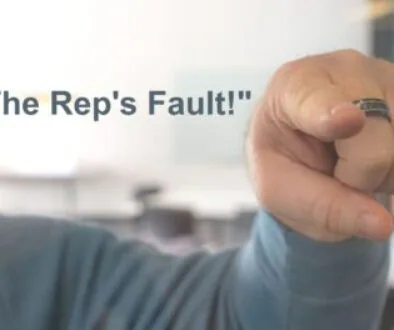Selling to Physicians—A problem or an opportunity: You’ve got 15 seconds.
If you sell to doctors in the U.S., it’s probably no surprise to you that many are not happy with their jobs and who can blame them. They are losing control of how they treat their patients, the government and insurance companies are telling them what they can charge for what they do, and the costs of maintaining a practice keep going up. A recent survey of 20,000 physicians confirmed their discontent in that 52% said that if they had it to do over, they wouldn’t go into medicine.
As a medical sales professional, you may be wondering, “So what does this have to do with me?” The answer is, “A lot!”
You have a 50-50 chance of calling on someone who wishes he or she was doing something else to earn a living. You have to acknowledge the possibility that the curiosity, wanderlust, and unlimited income potential that may have motivated some doctors to pursue a career in medicine has diminished. These doctors are not interested in spending time with salespeople just to know what’s available. The truth is, many no longer care. They just want to get through each day with as little interruption as possible.
Physicians who are less than satisfied with their careers often operate with a survival mentality, that is, “Don’t spend more than necessary (money AND time), do only what needs to be done, and don’t get sued.” Where do you fit into each customer’s thinking?
The Problem: If you are one of the majority of salespeople who is product-focused in your selling, you violate the time, money, and risk (don’t get sued) mindset. Whatever product you sell, customers already have a product that essentially does what yours does, or they feel they don’t need it. Looking at your product will consume valuable time and if they decide to buy, they’ll be spending money that they don’t want to spend. And finally, when you ask a physician to do something different than he or she is doing now, you introduce the element of risk because the outcome that will occur from using your product is unknown, even if it’s predictable (i.e., don’t mess with what’s working). So if you walk around trying to sell a “product,” you’ve already lost half your customers in the first 15 seconds of your sales presentation.
The Opportunity: Doctors who would choose another career over practicing medicine feel that way because of the increasing challenges in their professional and personal lives. When one of these physicians senses that you can eliminate, reduce, or make tolerable any of these challenges, you have their attention. Engage them in a compelling conversation that allows them to see, and more importantly to feel how they can achieve a desired or improved outcome for their patients in less time, with less money, and with reduced risk and you will have customers that are eager to buy. But this can only happen if you are focused on them and solving their problems or pain, not trying to sell a product.
What about the other 48% who said they would go into medicine again if they had it to do over? They might be slightly more open to meeting with sales reps, but truthfully, each of them is also a potential problem or opportunity. The bottom line is that most physicians won’t welcome an intrusion from a product salesman. However, they will MAKE TIME to talk to anyone who they truly believe can make their lives and their patients’ lives better.
You’ve got 15 seconds…
Average medical sales reps are an endangered species. Stop being average and learn how to sell like the top 5% of medical sales professionals with a comprehensive and convenient online eTraining course.


